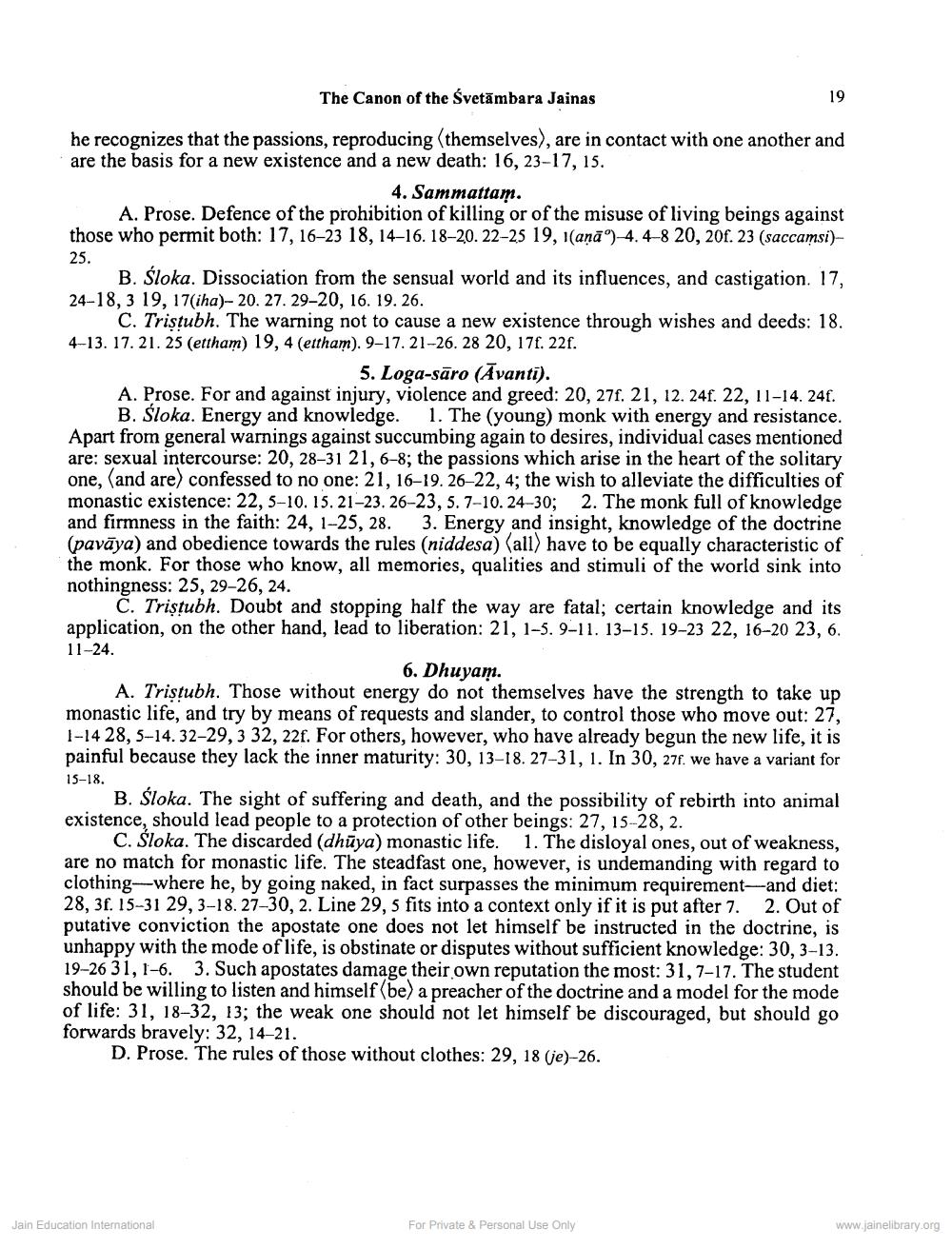________________
The Canon of the Svetāmbara Jainas
19
he recognizes that the passions, reproducing (themselves), are in contact with one another and are the basis for a new existence and a new death: 16, 23-17, 15.
4. Sammattam. A. Prose. Defence of the prohibition of killing or of the misuse of living beings against those who permit both: 17, 16-23 18, 14–16. 18–20.22-25 19, (anā°)-4.4-8 20, 20f. 23 (saccamsi) 25.
B. Śloka. Dissociation from the sensual world and its influences, and castigation. 17, 24-18,3 19, 17iha)- 20.27.29-20, 16. 19.26.
C. Tristubh. The warning not to cause a new existence through wishes and deeds: 18. 4-13. 17.21. 25 (ettham) 19, 4 (ettham). 9-17.21-26. 28 20, 17f. 22f.
5. Loga-sāro (Āvanti). A. Prose. For and against injury, violence and greed: 20, 27f. 21, 12. 24f. 22, 11-14. 24.
B. Sloka. Energy and knowledge. 1. The (young) monk with energy and resistance. Apart from general warnings against succumbing again to desires, individual cases mentioned are: sexual intercourse: 20, 28-31 21, 6-8; the passions which arise in the heart of the solitary one, and are) confessed to no one: 21, 16-19.26-22, 4; the wish to alleviate the difficulties of monastic existence: 22, 5-10. 15. 21-23.26-23, 5.7-10. 24-30; 2. The monk full of knowledge and firmness in the faith: 24, 1-25, 28. 3. Energy and insight, knowledge of the doctrine (pavāya) and obedience towards the rules (niddesa) (all) have to be equally characteristic of the monk. For those who know, all memories, qualities and stimuli of the world sink into nothingness: 25, 29-26, 24.
C. Tristubh. Doubt and stopping half the way are fatal; certain knowledge and its application, on the other hand, lead to liberation: 21, 1-5. 9-11. 13-15. 19-23 22, 16-20 23, 6. 11-24
6. Dhuyam. A. Tristubh. Those without energy do not themselves have the strength to take up monastic life, and try by means of requests and slander, to control those who move out: 27, 1-14 28, 5-14.32-29,3 32, 22f. For others, however, who have already begun the new life, it is painful because they lack the inner maturity: 30, 13-18. 27-31, 1. In 30, 27f. we have a variant for 15-18.
B. Sloka. The sight of suffering and death, and the possibility of rebirth into animal existence, should lead people to a protection of other beings: 27, 15-28, 2.
C. Sloka. The discarded (dhūya) monastic life. 1. The disloyal ones, out of weakness, are no match for monastic life. The steadfast one, however, is undemanding with regard to clothing-where he, by going naked, in fact surpasses the minimum requirement and diet: 28, 3f. 15-31 29, 3-18. 27-30, 2. Line 29, 5 fits into a context only if it is put after 7. 2. Out of putative conviction the apostate one does not let himself be instructed in the doctrine, is unhappy with the mode of life, is obstinate or disputes without sufficient knowledge: 30, 3-13. 19-26 31,1-6. 3. Such apostates damage their own reputation the most: 31,7-17. The student should be willing to listen and himself (be) a preacher of the doctrine and a model for the mode of life: 31, 18-32, 13; the weak one should not let himself be discouraged, but should go forwards bravely: 32, 14-21.
D. Prose. The rules of those without clothes: 29, 18 (je)-26.
Jain Education International
For Private & Personal Use Only
www.jainelibrary.org




